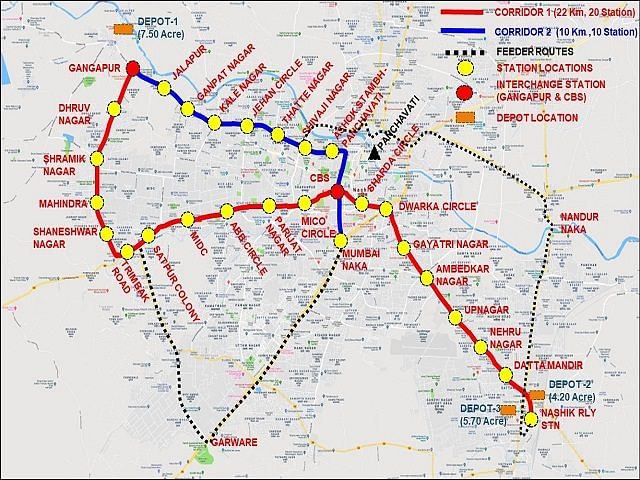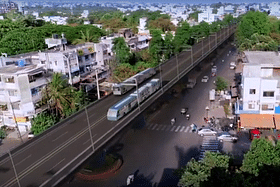With Nashik city being the frontrunner, MahaMetro is additionally working on the feasibility of implementing the Metro Neo system in cities having a population of up to 20 lakh and lower ridership demand at present.
The Maharashtra Metro Rail Corporation (Maha Metro) on 15 February 2023 presented the Nashik Metro Neo Project at the Prime Minister’s Office (PMO) in Delhi.
Brijesh Dixit, the managing director of MahaMetro, gave a detailed presentation about the entire Metro Neo project with technical specifications and the detailed project report (DPR).
The presentation was also attended by the Commissioner of Nashik Municipal Corporation (NMC) Chandrakant Pulkundwar.
As per sources from MahaMetro, assuming there are no additional questions from the PMO, the DPR will be submitted to the union cabinet for approval.
Upon approval, the organisation will release the tenders, and the actual work is expected to commence within four months following the completion of the tender process.
Nashik Metro Neo
With Nashik city being the frontrunner, MahaMetro is additionally working on the feasibility of implementing the Metro Neo system in cities having a population of up to 20 lakh and lower ridership demand at present.
Finance Minister Nirmala Sitharaman had announced the Nashik Neo metro project while presenting the Union Budget for the financial year 2021-22, making a provision of Rs 2,092 crore for the project implementation.
The metro network has been planned with two corridors and three depots stretching across the city.
One elevated corridor with a length of 22 km will stretch from Gangapur to Nashik Road railway station with 19 stations. The line will go through Satpur colony, CBS and Dwarka circle and towards Nashik Road.
The other elevated corridor will be a 10 km stretch between Gangapur and Mumbai Naka with 10 stations. The network will have two interchanging stations between the corridors.

In addition to the two elevated corridors, there will be two feeder routes spanning a total of 24km.
These will feature battery-powered buses that will run on the proposed feeder routes and the elevated wires.
Nashik is emerging as a highly promising new investment destination in North Maharashtra.
With the development of new infrastructure, the city is undergoing a transformation from a pilgrimage site to a dynamic urban centre. This report on the city’s growth potential provides further insight into its promising future.
What Is Metro Neo
With the promising potential of Nashik, and similarly for other tier-2 and tier-3 Indian cities, the Metro Neo aims to cater the requirements of these cities, where the ridership currently, is comparatively lesser.
A committee of transport experts was formed by the Ministry of Urban Transportation in India to standardise the specification of Metro Neo by analysing and studying the best transit systems available around the world.
Following a feasibility report and studies conducted in various countries, it was determined that the Metro Neo offers a suitable combination of features and represents an innovative solution for addressing the challenges of crowded transportation in smaller cities across India.
The system is a rubber-tyred electric coach powered by overhead traction running on a road slab with an exclusive right of way (ROW) or on elevated corridors.
It would have three-coach sets, with each being 12 m long and 2.5 m wide, with a floor height of 300-350 mm.
The coaches, constructed with either stainless steel or aluminum, will not only be smaller but also lighter than the conventional metro trains.
With an average axle load of approximately 10 tonnes, these coaches are significantly lighter than the typical 17-tonne Metro coaches.
Additionally, an Automatic Train Protection system with anti-collision functionality and predefined speed limits will be included.
It will be executed at a cost reduction of around 25 per cent of the conventional metro infrastructure.
With the estimates, it is stated that, where it costed around Rs 200 crore per kilometre for the conventional metro system, the Metro Neo, will be built at Rs 71 crore per kilometre.


